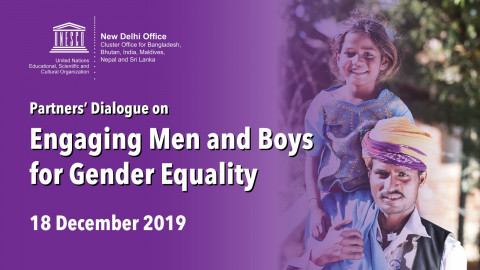
GCED Basic Search Form
Quick Search
현재 위치
뉴스

Against the background of the global and pervasive epidemic of violence against women, the United Nations Educational, Scientific and Cultural Organization (UNESCO) organized a Partners’ Dialogue on Engaging Men and Boys for Gender Equality on 18 December 2019, at the UNESCO House, New Delhi.
The Dialogue witnessed the convergence of media, civil society organizations, donor agencies, bi-lateral and multi-lateral organizations, research institutions, and the private sector to discuss the challenges of addressing gender based violence in India and share lessons on engaging men and boys to work for Sustainable Development Goal 5 on Gender Equality.
"UNESCO’s goal is to help erase gender based violence through the medium of education, culture and the sciences. We will support India in achieving its Sustainable Development Goals targets. This would require designing a conducive environment where men and boys are able to reflect on their roles, and become partners for equality, towards inclusion, peace and prosperity. This Dialogue has laid down a roadmap for partners in India to converge and take concrete steps in this direction."
- Eric Falt, UNESCO New Delhi Director in his opening remarks
A UNESCO preliminary stakeholders’ analysis presented during the Dialogue, identifies organizations and interventions working with men and boys across India to transform masculinities. The non-exhaustive analysis highlights the positive impact of campaigns like HeForShe (UnWomen), Mardon Waali Baat (The YP Foundation) and Bell Bajao (Breakthrough India), among many others. This analysis underscores the need for engagement with boys and men to eradicate gender based violence in India. The report further states that the social development ecosystem needs to prioritize the transformation of mentalities among boys and men.
The Dialogue began with academics and thought leaders deliberating on the historical roots and conceptualization of masculinities (i.e. what it is to be a man in a given society), in India. A major barrier highlighted during the dialogue was lack of awareness on these issues together with the lack of alternative models for what it is to be a man, to counter balance the hegemonic or prevailing conception of masculinities, which contribute to gender inequality or violence against women.
Subsequently, civil society and research organizations like the YP Foundation and The Abdul Latif Jameel Poverty Action Lab (J-PAL) presented findings of interventions that worked with men to address gender based violence and masculinities. The role of the private sector, multi-lateral bodies and national policy frameworks, was discussed in the final session of the day.
The Dialogue concluded with the stakeholders identifying priority areas such as educational reforms, shifts in societal values and the role of community leaders. These thus delineates the path to move towards a society where men at the same time do not see their self-realization hindered by stereotypes or social constraints, and are empowered to make positive contributions to a peaceful and prosperous world where men and women can equally thrive.
For further information contact:
Rekha Beri, Public Information (r.beri@unesco.org)
Nitya Agarwal, Public Information(n.agarwal@unesco.org)
URL:
https://en.unesco.org/news/transforming-mentalities-and-promoting-gender-equality-india
